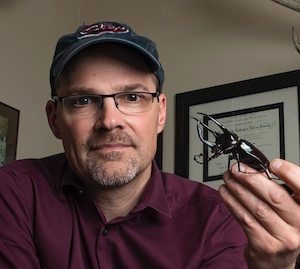Douglas Emlen, Regents Professor of Biology at the University of Montana, is one of 13 preeminent scholars in the liberal arts and sciences selected to serve as ΦBK Visiting Scholars during the 2024–2025 academic year.
Professor Emlen studies “extreme” animal weapons including antlers and, especially, the outlandish horns of rhinoceros beetles. His first book, Animal Weapons: The Evolution of Battle (2014), received the Phi Beta Kappa Award in Science. It compared arms races in animal weapons to those that occur in manufactured military weapon technologies. His second book, Beetle Battles: One Scientist’s Journey of Adventure and Discovery (2019), is narrative nonfiction for middle school readers, and his textbook Evolution: Making Sense of Life, co-authored with New York Times science writer Carl Zimmer, is currently adopted at more than 300 colleges and universities. Emlen’s research has been featured in outlets including The New York Times, on National Public Radio’s Fresh Air and Science Friday, and on YouTube’s SciShow and MeatEater. He recently appeared in documentaries about his work for the BBC (Nature’s Wildest Weapons) and NOVA (“Extreme Animal Weapons”). Emlen is an elected member of the American Academy of Arts and Sciences and the National Academy of Sciences.
As a ΦBK Visiting Scholar, Emlen will visit Gettysburg College, North Carolina State University, Texas Tech University, University of Florida, University of Mary Washington, and University of Richmond over the course of a year. He will spend two days on each campus, meet with students and faculty, participate in classroom discussions, and give a lecture that is free and open to the public.
“I’m honored to represent Phi Beta Kappa this year,” Emlen said. “I love sharing the excitement and societal relevance of modern evolutionary biology with students, challenging them to step out of their comfort zones and confront big topics in new ways. Just as importantly, I am eager to learn from the students—tomorrow’s leaders—hearing their thoughts and perspectives on the best path forward for science and for society.”
Learn more about this year’s ΦBK Visiting Scholars at pbk.org/VisitingScholars or contact Hadley Kelly, director of the Visiting Scholar Program, at hkelly@pbk.org.




